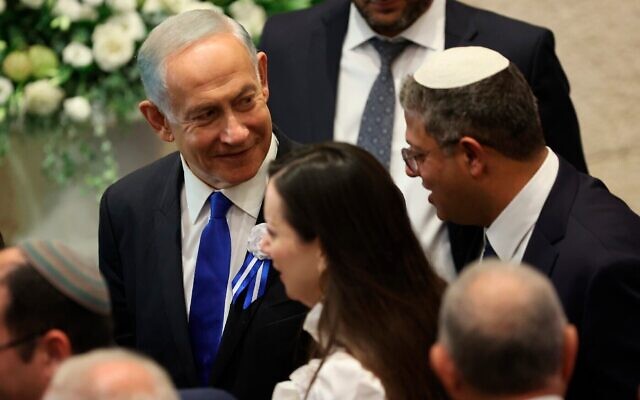Netanyahu agrees to Ben Gvir demand to legalise dozens of outposts, Homesh yeshiva
After politicians sit down for talks, Likud says deal reached to legalize West Bank outposts within 60 days of government being formed, amend Disengagement Law to legalize Homesh

Israeli Prime Minister-designate Benjamin Netanyahu and Otzma Yehudit head Itamar Ben Gvir agreed on Wednesday to a series of legislative initiatives that the extremist lawmaker has been pushing for, Netanyahu’s Likud party said, as coalition talks appeared stuck with two of his other allies.
Those bills include retroactively legalising dozens of illegal West Bank outposts, sometimes known as “young settlements,” within 60 days of the government being sworn in, changing the 2005 Disengagement Law in a way that would allow the legalisation of the controversial Homesh outpost and yeshiva in the West Bank, and a minimum sentence for agricultural crimes.
Likud said they also agreed to accelerate the expansion of Route 60 — the main north-south highway through the West Bank — the building of bypass roads, and a broadening of an existing law that prevents criminal charges from being brought against someone using force to protect their home to also apply to anyone defending an IDF army base.
The announcement came after Netanyahu met with Ben Gvir, with Likud stating afterward that the pair made “significant advancements.” Even if such promises are ultimately entered into the coalition agreements, there is no guarantee they would manage to pass in the Knesset.
Ben Gvir has publicly demanded that he be given the position of public security minister, a post that has worried several Western allies in light of his incendiary background, which includes convictions for supporting a terror group and incitement to racism.
It remains unclear if Netanyahu is willing to hand him the job, although he said before the elections that Ben Gvir was an acceptable candidate for it.

Despite the apparent progress with Ben Gvir, Netanyahu continued to remain at odds with Bezalel Smotrich, leader of Religious Zionism, the far-right alliance that includes Ben Gvir’s Otzma Yehudit.
The two met Tuesday in a bid to bridge Smotrich’s insistence on either the Treasury or the Defence Ministry portfolio, the latter of which Netanyahu reportedly does not want to give him amid reported US objections, and the former of which the Likud leader’s senior partner Aryeh Deri has demanded for himself.
According to Israeli television reports Wednesday, the meeting between Netanyahu and Smotrich became charged, with the Likud chief saying Religious Zionism’s strong showing in the November 1 vote was due to his role in brokering the alliance with Otzma Yehudit.
“Don’t forget that thanks to me you united with Ben Gvir and have 14 seats,” Netanyahu was quoted as saying by Channel 12 news.
Firing back, Smotrich claimed credit for the outgoing government’s downfall.
“Don’t forget that it was thanks to me that [Idit] Silman left the coalition and thanks to my opposition that the partnership with Ra’am became illegitimate,” Smotrich reportedly said, referring to a rebel MK who helped topple the Lapid government and is now in Likud, and an Islamist party whose backing for a Netanyahu-led government Smotrich has opposed.
A separate report by the Kan public broadcaster said Smotrich hit out at Netanyahu over the apparent US opposition to him serving as defence minister.
“The Americans will decide who will be appointed minister? It’s not meant to work like that,” Smotrich reportedly told Netanyahu.
The report also said Netanyahu and Smotrich have not had any contact since meeting on Tuesday.
Meanwhile, the newspaper of Deri’s ultra-Orthodox Shas party was due to run a cover story Thursday saying the faction’s spiritual leadership was demanding the Finance Ministry. The front page also said the Council of Torah Sages called on Deri not to accept Netanyahu’s offer of the Defence Ministry.
Deri met with Netanyahu on Wednesday, after which the Likud head urged patience as his bid to swiftly swear in a new government after the elections stalled.
“A little patience, and with God’s help, we’ll establish a right-wing government,” Netanyahu told reporters after the meeting.
Along with Shas and Religious Zionism’s component factions, Netanyahu’s expected 64-seat coalition is also due to include the ultra-Orthodox United Torah Judaism, with which Likud has likewise been holding coalition negotiations.
Along with reportedly agreeing to nearly double monthly stipends for yeshiva students, Channel 12 said Wednesday that Likud okayed UTJ’s demand to advance a law allowing hospitals to bar visitors from bringing leavened food products into medical centres during Passover.
The legislation would directly contradict a High Court of Justice ruling from 2020 that has been denounced by religious lawmakers.
UTJ and other allies of Netanyahu have been pushing for a controversial measure that would allow a majority of Knesset members to overturn decisions by the court, drastically curbing judicial oversight.
Some of Netanyahu’s partners have also called for legislation that would end his ongoing trial on corruption charges.
Netanyahu officially received a mandate to form a government on Sunday, giving him 28 days to assemble a majority coalition. If he needs more time, he could seek a 14-day extension from President Isaac Herzog.
TIMES OF ISRAEL

comments